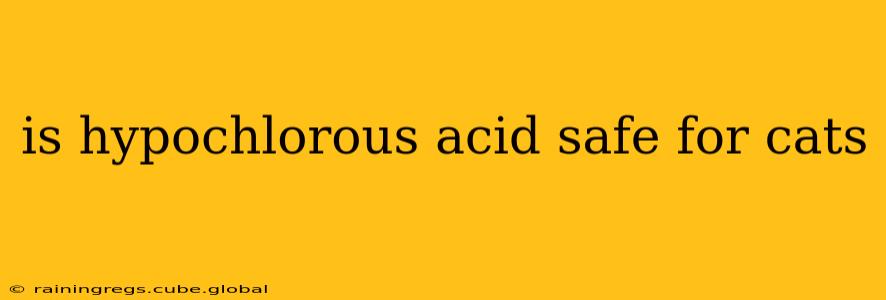Hypochlorous acid (HOCl) is a naturally occurring compound with potent disinfecting properties. It's increasingly used in household cleaning and personal hygiene products, sparking questions about its safety around pets, especially cats. The short answer is: it's complex. While generally considered safer than traditional bleach, its safety for cats depends heavily on concentration, application method, and the cat's individual sensitivities.
What is Hypochlorous Acid?
Hypochlorous acid is a weak acid produced by the body's immune system to fight infection. It's also found in diluted forms in many commercial cleaning solutions, often marketed as a "safe" alternative to harsh chemicals. This diluted form is typically much less irritating than other disinfectants. However, the key word here is diluted. Concentrated HOCl is a different story.
Is Diluted Hypochlorous Acid Safe for Cats?
Diluted, commercially available hypochlorous acid solutions, used correctly, generally pose a lower risk to cats than other disinfectants like bleach. These solutions often have a low concentration of HOCl and are designed for topical application. However, even diluted solutions should never be ingested by your cat. Direct contact with eyes or open wounds should also be avoided.
Important Note: Always check the product label for specific instructions and safety precautions before using any hypochlorous acid-based product near your cat. If you have concerns, consult your veterinarian.
What Happens if My Cat Ingests Hypochlorous Acid?
Ingestion of even diluted hypochlorous acid can cause irritation to the mouth, esophagus, and stomach. Symptoms might include vomiting, diarrhea, and excessive drooling. Immediate veterinary attention is crucial if you suspect your cat has ingested HOCl.
Can Hypochlorous Acid Be Used to Clean Cat Litter Boxes?
While some manufacturers claim their hypochlorous acid-based cleaners are safe for pet areas, it's generally best to avoid using them directly on or near your cat's litter box. The residual scent, even in diluted form, might deter your cat from using the litter box. Furthermore, there's a risk your cat could ingest some of the cleaner while grooming or using the litter box. Opt for cat-safe cleaning solutions designed specifically for litter boxes.
What are the Best Cleaning Methods for Cat Areas?
To maintain a clean and hygienic environment for your cat without risking exposure to harmful chemicals, consider these alternatives to hypochlorous acid:
- Enzyme cleaners: These cleaners are specifically formulated to break down organic matter like urine and feces, eliminating odors effectively.
- Simple soap and water: Often the most effective and safest method for cleaning most surfaces.
- Veterinarian-recommended disinfectants: Your veterinarian can recommend specific disinfectants safe for use in your home with pets.
Is Hypochlorous Acid Toxic to Cats?
Hypochlorous acid is not inherently "toxic" in the same way as some strong poisons. However, it can cause irritation and other adverse effects if ingested or applied improperly. The toxicity depends on the concentration and the cat's exposure. Think of it like this: salt is not toxic, but ingesting a large amount can cause serious problems.
Alternatives to Hypochlorous Acid for Disinfecting Pet Areas?
Many excellent pet-safe cleaning products are available that don't rely on hypochlorous acid. Look for products explicitly labeled as safe for use around pets and follow the instructions carefully.
In conclusion, while diluted hypochlorous acid might seem like a safer alternative to some traditional disinfectants, caution is always advised when using it around cats. Prioritizing pet safety and choosing pet-specific cleaning products is always the best approach. When in doubt, consult your veterinarian.
